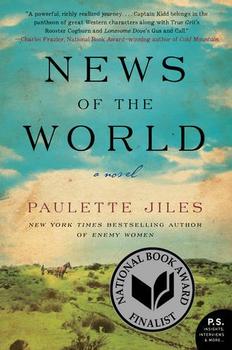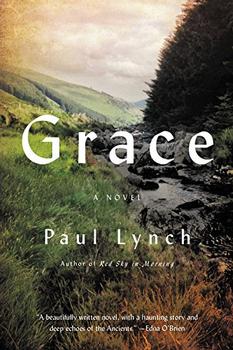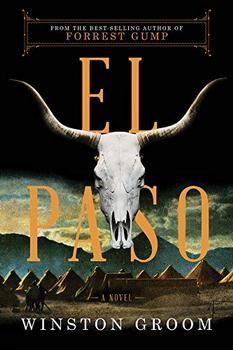Summary | Excerpt | Reading Guide | Discuss | Reviews | Beyond the book | Read-Alikes | Genres & Themes | Author Bio

It is 1870 and Captain Jefferson Kyle Kidd travels through northern Texas, giving live readings to paying audiences hungry for news of the world. An elderly widower who has lived through three wars and fought in two of them, the captain enjoys his rootless, solitary existence.
In Wichita Falls, he is offered a $50 gold piece to deliver a young orphan to her relatives in San Antonio. Four years earlier, a band of Kiowa raiders killed Johanna's parents and sister; sparing the little girl, they raised her as one of their own. Recently rescued by the U.S. army, the ten-year-old has once again been torn away from the only home she knows.
Their 400-mile journey south through unsettled territory and unforgiving terrain proves difficult and at times dangerous. Johanna has forgotten the English language, tries to escape at every opportunity, throws away her shoes, and refuses to act "civilized." Yet as the miles pass, the two lonely survivors tentatively begin to trust each other, forging a bond that marks the difference between life and death in this treacherous land.
Arriving in San Antonio, the reunion is neither happy nor welcome. The captain must hand Johanna over to an aunt and uncle she does not remember - strangers who regard her as an unwanted burden. A respectable man, Captain Kidd is faced with a terrible choice: abandon the girl to her fate or become - in the eyes of the law - a kidnapper himself. Exquisitely rendered and morally complex, News of the World is a brilliant work of historical fiction that explores the boundaries of family, responsibility, honor, and trust.
CHAPTER ONE
Wichita Falls, Texas, Winter 1870
Captain Kidd laid out the Boston Morning Journal on the lectern and began to read from the article on the Fifteenth Amendment. He had been born in 1798 and the third war of his lifetime had ended five years ago and he hoped never to see another but now the news of the world aged him more than time itself. Still he stayed his rounds, even during the cold spring rains. He had been at one time a printer but the war had taken his press and everything else, the economy of the Confederacy had fallen apart even before the surrender and so he now made his living in this drifting from one town to another in North Texas with his newspapers and journals in a waterproof portfolio and his coat collar turned up against the weather. He rode a very good horse and was concerned that someone might try to take the horse from him but so far so good. So he had arrived in Wichita Falls on February 26thand tacked up his posters and put on his reading clothes in the...
Here are some of the comments posted about News of the World in our legacy forum.
You can see the full discussion here.
Discuss Captain Jefferson Kyle Kidd's work as a newspaper reader
First, I think Kidd was always interested in news and the printing world and he preferred to remain a part of that. Secondly, I think he enjoyed all the traveling. He appeared to be a curious person and both of those facts fit him well. - taking.mytime
Do you agree with Doris Dillon's assessment of Johanna?
In the Author's Note at the end of the book, Pauline Jiles says directly that Doris Dillon best expresses her view of Johanna's experience as a child captive. Doris says that Johanna is "like an elf. She is like a fairy person from the glamorie. They... - KateB
How did Johanna wanting to scalp her fallen family make you feel about her?
I really gave no thought to this. Johanna was raised by Kiowa. This was a tradition of the Kiowa - why would she not expect to scalp? - taking.mytime
How did the title of the novel fit into the novel's narrative? Did the title suit the novel?
Initially I was not keen on this title. There used to be a paper published in the UK called the News of the World and it was shut down in scandal in 2011. So before I read this novel, that is what the title conjured up for me and that certainly doesn... - KateB
How did you interpret Captain Kidd's final lines? What message do you think he carries?
I think he expected to continue in the same roll once he pasted. He enjoyed his work, never knowing exactly what he would be reading until just before he read. He stated 'content unknown' since he was unsure of his next reading - where ever that may ... - taking.mytime
This is a beautiful and spare novel. The landscape comes alive, as does the almost constant sense of desperation of being on the road during such dangerous times. The author has a true gift for description, we see, smell and feel the conditions the pair experience. (Ruthie A)..continued
Full Review
(703 words)
This review is available to non-members for a limited time. For full access,
become a member today.
(Reviewed by First Impressions Reviewers).
Paulette Jiles' News of the World takes place in late 19th century Texas. Much of the state's land was untamed and rugged, but in this time between the end of the Reconstruction and the beginning of the Progressive Era, Texas changed and grew, as did much of the western frontier and the New South.
 It was the era of cotton, cattle and railroads, and it was a time of economic growth. Cotton was the most common crop grown for profit, and corn was the most common food crop. In fact, agriculture dominated the state economy, and much of it centered on ranching. Texas had always been cattle country, but after the Civil War, the economic importance of livestock grew. Wild longhorn cattle could be sold in the northern United States for up to six...
It was the era of cotton, cattle and railroads, and it was a time of economic growth. Cotton was the most common crop grown for profit, and corn was the most common food crop. In fact, agriculture dominated the state economy, and much of it centered on ranching. Texas had always been cattle country, but after the Civil War, the economic importance of livestock grew. Wild longhorn cattle could be sold in the northern United States for up to six...
This "beyond the book" feature is available to non-members for a limited time. Join today for full access.

If you liked News of the World, try these:

by Paul Lynch
Published 2018
A sweeping, Dickensian story of a young girl on a life-changing journey across nineteenth-century Ireland on the eve of the Great Famine.

by Winston Groom
Published 2017
Three decades after the first publication of Forrest Gump, and seventeen years since his last novel, Winston Groom returns to fiction with this sweeping American epic.




Not doing more than the average is what keeps the average down.
Click Here to find out who said this, as well as discovering other famous literary quotes!